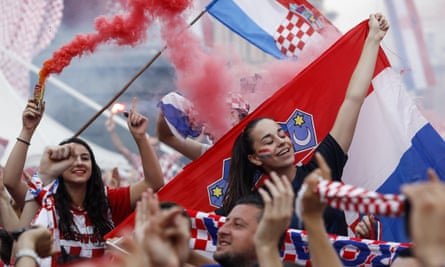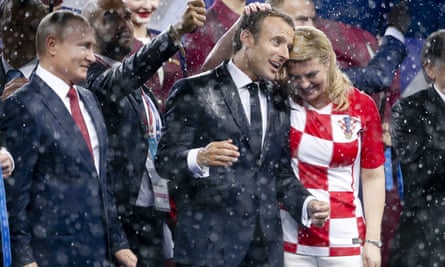In the end, the fairytale was not to be. As the clock ticked down to the end of the World Cup final, the disheartened voice of the commentator easily carried over the now silent crowd of tens of thousands who had gathered with so much hope in Ban Jelačić Square in Zagreb. As the final whistle blew, and it was confirmed that France had won 4-2, the crowd that had been mostly quiet for the last 10 minutes of the game started clapping.
Fans who had gathered in cafes and other viewing spots around town started moving towards the square to join the main crowd as Lijepa Naša, the Croatian anthem, blared out from the big speakers.
“We are sad, but second place is still a big deal for Croatia. We’ll all forget about it all once they come home tomorrow,” says Marijana Pereira, a 26-year-old teacher.
Earlier, the huge crowd had gathered in Zagreb from all corners of Croatia to watch the big screen in the square. The city of Osijek rented an entire passenger train for their fans and the Croatian railways slashed 50% off their regular price for all others wanting to join their checkerboard-clad countrymen in the capital.
The heavy rain that flooded the city from early Sunday morning stopped shortly before the start of the match. That did not stop fans from materialising on the square much earlier, raincoats and umbrellas in tow. Even the tourists, visiting Croatia at the peak of its holiday season, were seen purchasing jerseys, red-and-white checkered hats and mini Croatian flags from the vendors selling football paraphernalia all over town.

The enthusiasm was still palpable after the first goal, since Croatian fans were used to seeing their team let goals through early in the game. During half-time, a compere addressing the crowd from the main stage told those gathered to keep their spirits up and to trust that “our boys” could win. After the fourth goal, the crowd grew silent and only reacted, half-heartedly, to missed Croatian opportunities.
“I feel great. We still made history, even thought we did not become champions,” says Mato Musulin, 47, the head of a company in Frankfurt who came to Croatia for the final.
“For us, this means more than a mere sporting victory,” said Miroslav Blažević, a household name in Croatian football. Blažević’s team secured third place in the 1998 World Cup, the country’s crowning achievement before this year. “Today there are still corners of the world that haven’t heard about Croatia. After tonight, the whole world will know who we are.”
The country has stood still since Wednesday, when the team qualified for the final. News outlets announced they were reporting on nothing else but the match until Monday, historic sites were closed, and even theatre performances rescheduled. The afternoon Sunday mass at the Church of the Holy Mother of Freedom in Zagreb was moved from 5pm to 7:30pm so the congregation could watch the game.
“This is history in the making. I never thought I would experience this in my lifetime. There is no event in the past 10 to 20 years that can be compared to this,” said 27-year-old Marjan Benić, who watched the game with friends on the square.
Despite the result, the players have already cemented their legacy as national heroes. A parade in honour of their return from Moscow is set for Monday, with an open-top bus transporting them from the airport. Croatian prime minister Andrej Plenković has asked that companies relieve employees of their duties that day so they can greet the team as they pass through town. Plenković joined fans on the square on Sunday, choosing to celebrate in the capital rather than join the official delegation in Russia.

President Kolinda Grabar-Kitarović, who became the subject of many a meme due to her enthusiastic cheering in the stands and her post-match celebrations with the team in the locker rooms, will be honouring the entire team with the Order of the Croatian Danica once they return – Croatian Serb scientist Nikola Tesla is a previous recipient.
But some have been critical of the all-consuming nature of the support for Croatia’s team, with the economy struggling and young people leaving the country in droves. Croatia is the poorest nation in the EU with a tourism-centric economy, even though it is considered far more developed than its western Balkan neighbours.
Longtime journalist and editor Viktor Ivančić said the success of the Croatian team came at an opportune moment for the government. “This was a gift from the heavens for political elites in the country. They are inflating this as much as they can, and trying to camouflage all the deficiencies of the country with it.”